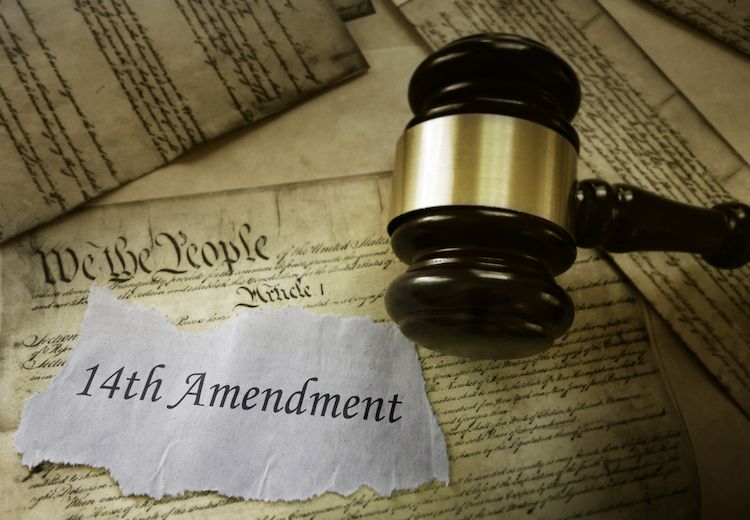Could the 14th Amendment be used to disqualify Trump from office?

Image from Shutterstock.com.
Impeachment isn’t the only recourse of Congress against President Donald Trump for statements leading up to the Jan. 6 riot at the U.S. Capitol, according to constitutional scholars.
Section 3 of the 14th Amendment could be used to bar Trump from holding federal office in the future, according to experts who spoke with the Washington Post and op-eds published by the Washington Post, Bloomberg Opinion and the New York Times.
Section 3 bars people who have taken an oath to support the U.S. Constitution from holding federal office if they “engaged in insurrection or rebellion” against the Constitution or have “given aid to the enemies” of the United States. A waiver by a supermajority of Congress can lift the ban.
Section 3 of the amendment, which was passed after the Civil War, was intended to bar civil or military officers who supported the Confederacy from taking office, according to an article by Gerard N. Magliocca, a professor at the Indiana University Robert H. McKinney School of Law who spoke with the Washington Post and is a co-author of the Washington Post op-ed.
Congress gave amnesty to most former Confederates with a two-thirds vote in 1872, then granted broader amnesty in 1898. The waiver doesn’t bar the provision from being applied today, Magliocca told the Washington Post.
Congress could find that Trump engaged in insurrection or rebellion by encouraging the attack against the Capitol. The House of Representatives has already outlined its theory against Trump in an article of impeachment filed Monday.
The impeachment article says Trump encouraged insurrection through false assertions of widespread election fraud and statements in a speech before the Jan. 6 riot. The statements included, “If you don’t fight like hell, you’re not going to have a country anymore.”
A Section 3 vote would need only a simple majority vote of both houses, compared to the two-thirds vote needed for the Senate to convict Trump in an impeachment trial, according to the Washington Post op-ed, which is co-authored by Bruce Ackerman, a professor at Yale Law School.
Section 3 of the 14th Amendment reads:
“No person shall be a senator or representative in Congress, or elector of president and vice president, or hold any office, civil or military, under the United States, or under any state, who, having previously taken an oath, as a member of Congress, or as an officer of the United States, or as a member of any state legislature, or as an executive or judicial officer of any state, to support the Constitution of the United States, shall have engaged in insurrection or rebellion against the same, or given aid or comfort to the enemies thereof. But Congress may by a vote of two-thirds of each House, remove such disability.”
Congress could enforce Section 3 by passing a law declaring that anyone sworn to uphold the Constitution who incited, directed or participated in the Jan. 6 Capitol riot engaged in insurrection or rebellion, according to the New York Times op-ed by lawyer Deepak Gupta and Brian Beutler, editor-in-chief of Crooked Media. The law would say those people are disqualified from office in the future.
Congress could also pass nonbinding sense-of-Congress resolutions that specify which people lawmakers intend to disqualify from office, the New York Times op-ed says. Those resolutions could provide guidance to election officials and judges applying the law after investigations are complete and more facts are known.
Trump could appeal a Section 3 determination by Congress to the courts, where he would have to face detailed questioning in a judicial proceeding, the Washington Post op-ed says.
Even if Congress doesn’t act, it’s likely that someone will ask a court to declare Trump ineligible for office if he runs again for president, according to the Bloomberg Opinion article by Noah Feldman, a professor at Harvard Law School.
Feldman noted the 14th Amendment doesn’t use the word “sedition,” which is often used to describe statements that organize or plan an insurrection. Trump could argue that the absence of the word means that Trump did not himself engage in insurrection through his words. The counterargument is that inciting a crowd to engage in insurrection is itself insurrectionary.
Should Congress impeach Trump, as well as invoke Section 3? The New York Times op-ed says it’s a good idea.
But the Washington Post op-ed says the Constitution envisions impeachment only as a tool against a president while in office. The constitutionality of a Senate trial held after Trump leaves office is “problematic,” the authors say.



